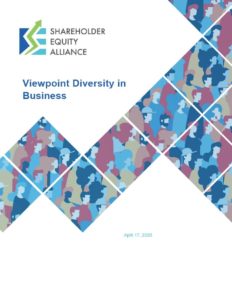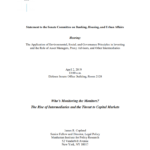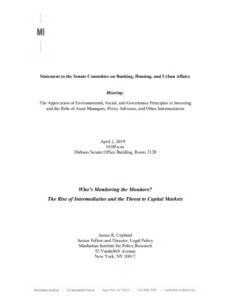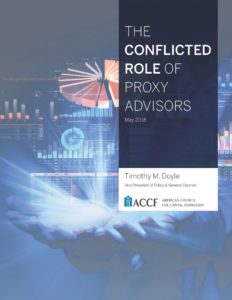
Publications
Publication
Environmental, Social, and Governance Theory
The concept known as environmental, social, and governance (ESG) theory has a long history of similar, predecessor concepts both in academic literature and in the business world. For over a century, critics of the market economy, largely inspired by progressive political goals, have argued that for-profit corporations should not limit them- selves to seeking profits for their shareholders, but should engage—or be required to engage—in various sorts of activism to…
Publication
Cornell Law Review: The Illusory Promise of Stakeholder Governance
The switch towards "stakeholderism" sounds good, but it may not be all it's cracked up to be.
Publication
Viewpoint Diversity in Business
Viewpoint diversity is an essential component of corporate governance. Respecting different social, political, and religious beliefs in policy, governance, and the marketplace helps companies mitigate risk, improve performance, and better align business goals with shareholders’ interests. Promoting robust viewpoint diversity also enriches and strengthens society by fostering a culture that respects free speech, religious tolerance, and open discourse. When companies have a narrow approach to diversity, for example, one which…
Publication
Manhattan Institute: Senate Testimony of James R. Copeland
On April 2, 2019, James R. Copland testified before the U.S. Senate Committee on Banking, Housing, and Urban Affairs in a hearing entitled “The Application of Environmental, Social, and Governance Principles in Investing and the Role of Asset Managers, Proxy Advisors, and Other Intermediaries.” Learn more at the Manhattan Institute for Policy Research.
Publication
The Conflicted Role of Proxy Advisors
Major investors increasingly rely on the services of external providers to support investment-related decisions. In the world of proxy voting, the two largest advisory services for institutional shareholders control an estimated 97 percent of the market and are able to impact major voting decisions with their recommendations. In recent years, these firms have emerged as quasi-regulators leveraging their influence to require disclosure from public companies without any actual statutory powers,…









